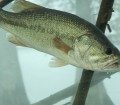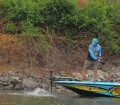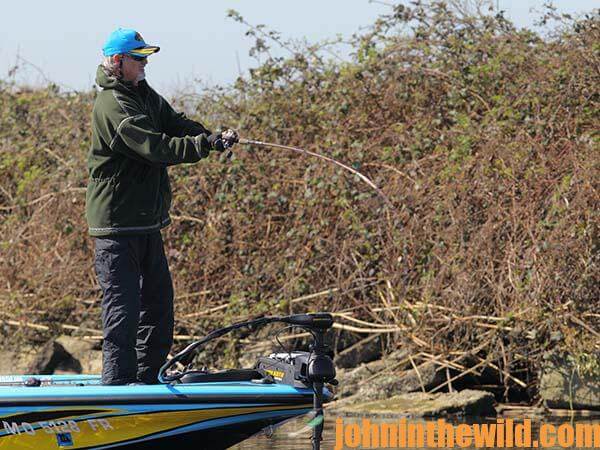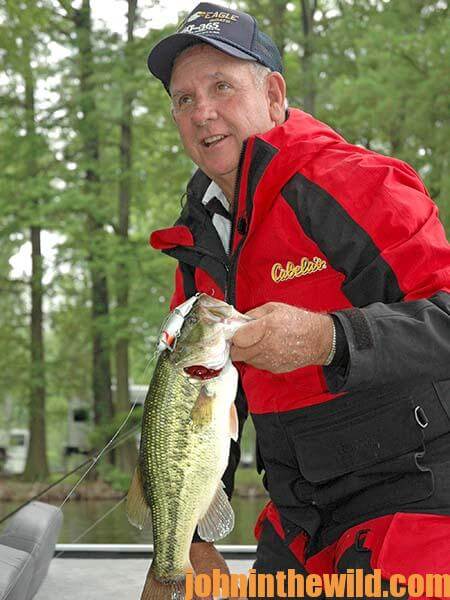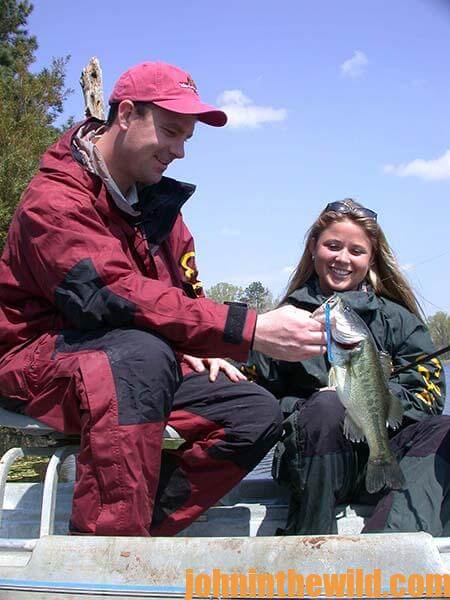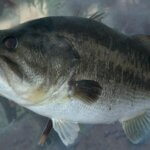John’s Note: This year 2013 anglers have experienced about every type of bad weather affecting much of the nation, particularly rain, floods and rising water. Outdoor writer John E. Phillips has talked with some of the tried-and-true bass fishermen who must catch fish no matter what the weather is. Rick Clunn www.rickclunn.com, a professional bass fisherman from Ava, Missouri, has won the Bassmaster Classic tournament 4 times, tying him with Kevin VanDam for most wins, and has been Angler of the year. Clunn is considered one of the best anglers of all time, having placed in the top 10 in over 100 tournaments and winning 17 of those. Clunn also has been inducted into the Bass Hall of Fame. Here are some of Rick Clunn’s tactics for finding bass in falling waters.
Competition fishermen like Rick Clunn don’t have the advantage of being able to go home and return another day, if they get to the lake and find the mud rising. Clunn and his fellow contenders have paid their entry fees, towed their boats across the country and come to fish. As professional anglers, they have to catch fish under sometimes adverse weather and water conditions to be competitive and continue on the tournament circuit. The bassing pros have learned to fish when the mud is rising.
“When muddy water really pours into a lake, bass usually are easy to find,” Rick Clunn explains. “The best method of locating these fish is not to run up and down the lake all day looking for them. A friend and I will hire a Piper Cub and fly over the lake before we plan to fish. This tactic can save money and time. If an angler runs all over the lake looking for clear water all of one day, he will spend more money and time than I will in a plane and still may not know where the clearest water is. Oftentimes the clarity of the water changes so slightly that from a boat the angler may not notice the change. But from the air, I can spot even the slightest color alterations and where they occur. Then I easily and quickly can find the clearest water on the lake or river I plan to fish. No matter how muddy a reservoir may appear there always are some areas that are less stained than others, which is where you most often will find the bass.
“When I am in the airplane, I’ll have a good lake map in my lap, and I’ll mark the map with symbols as I fly. One symbol is marginal water, and another symbol is the really-unacceptable water. Most of the time a muddy-water condition will happen during the early spring when the water is cold. Fast-moving, stained water will rush into a reservoir and trap pockets of clear water in coves. Another region that will trap clear water is where there is heavy vegetation. That vegetation will hold clear water behind it and seems to filter-out the mud. Other places to look for clear water are in the backs of creeks where there is a dam for a private pond. If the pond is big enough to hold most of the muddy water that will have run into the lake, the creek still will be relatively clear – or at least the back of the creek will be clear.
“However, why an area holds clear water is not nearly as important as knowing where the clear water is. Once you locate the clearest water, you next must know how well the fish’s senses are defined to know how to catch them. Then you need to know how often the lake will mud-up. A lake that stays muddy often will have bass that have much-keener sonar than the bass that live in a lake that stays clear most of the year. The stained-water fish have to rely on their sonar to find food, not run into stumps and get out of the way of other objects in the water. These bass are the easiest to catch, because they don’t have to see the lure to attack. The vibrations from the lure actually call these bass. But, a lake that is historically clear but muds-up during the week you plan to fish will have some of the most-difficult bass to take, because the bass are accustomed to feeding by sight and haven’t developed their sonar as well as the stained-water bass have. When the mud comes, and this bass can’t see, it won’t move as far to take a bait as some other bass will.
“This has been proven to my satisfaction by experiments performed by the late Glen Lau, a noted outdoor photographer. Glen had bass brought to him from muddy water that he placed in his clear-water aquariums. These bass never ran into the glass walls that held them. However, when Glen had bass brought in from clean springs, the bass ran into the glass several times before they learned to depend more on their sonar than their sight. So, I believe that fish that are accustomed to stained water and utilizing their sonar to find food will bite quicker and better under muddy water conditions than bass that are accustomed to seeing their food in clear water and striking.
“Knowing which senses the bass are in the habit of utilizing determines your presentation and lure selection. Fish accustomed to stained water will attack bulk baits best. A bulk bait is one that displaces a lot of water like a big-bladed spinner bait, a big jig with a lot of rubber skirt and big pork trailer on it, big fat plastic worms or plastic lizards and big crankbaits. Big baits that can be worked slowly and displace a lot of water will give-off more vibrations for the bass to hone-in on than the smaller baits will. Expect these bass to be shallow, because the water will clear from the top down with the clearest water being on the surface.
“Although bass don’t like light, they do relate to it. I believe in the theory, ‘Where there is no light there is no life.’ I believe the bass come-up to the clear water, and the light can be caught in the upper part of muddy water. Even though you’re fishing in 10 feet of water, you are only going to be fishing in the first 2 feet of that water. My two choices of baits when the mud is rising on a lake that normally is stained are first a big-bladed spinner bait, and second, a pig and jig. I will flip the pig and jig in the first 2 feet of cover to try and get the bass to hit. On clear-water bass that find themselves trapped in muddy water, I prefer to fish a fat (large diameter) plastic worm. One year when I fished a western lake, I found a lot of big, extremely-aggressive bass holding in treetops. However, they wouldn’t take the spinner bait. The lure seemed to scare the bass. So, I changed to a fat worm, slowed my retrieve down and caught the fish. On lakes that normally are clear but then mud-up, a great deal of sound or water displacement by the lure actually can scare more bass than it calls. That is why I prefer a fat worm or a pig and jig worked slowly on those types of lakes.
“Another lure that produces a lot of bass in lakes that are generally clear is the small, shallow-running crankbait. This lure is most effective where you find extremely-clear water 12-inches down from the surface, and the bass are accustomed to feeding by sight. The fish will hold in that clear water as the lake begins settle, and they will be looking for those little baitfish. The bass often will be holding next to logs or brush. Water temperature is another signpost that that can point you in the right direction in your lure selection. If the water that has brought the mud into the lake has come from a warm rain and there’s a 10-degree difference in the clear-water pockets and the muddy water surrounding it, a buzzbait may be an extremely-deadly lure. You can find the water temperature by using a temperature gauge. If the rain has been warm, the muddy water should be warmer than the clear water, because the clear is the older, colder water.
“There are some advantages associated with fishing when the mud is rising. First of all, there will be very little competition for the bass from other anglers. Most bassers will see the mud and go home. Therefore, you may find few, if any, boats on the lake when you fish the mud. And, the mud will tend to concentrate bass in clear-water pockets. So, once you locate these places you may enjoy excellent fishing. For the weekend fisherman, muddy water can be a productive way to concentrate and catch bass. For the tournament angler, muddy water is a nightmare. Although mud concentrates the bass into small areas, during a tournament that same mud draws the pro anglers into those same regions. The competition water shrinks drastically, and there are more anglers competing for the same bass in the same places. I hate to see muddy water during a tournament. But at any other time, I really like muddy water, because I know right where the bass will be when the mud is rising. When I locate that clear water, I can find the bass. I think many times bass fishermen become discouraged when they drive up to the lake and see the mud rising, but they shouldn’t be. By learning to fish in the rising mud you greatly will increase your ability to catch bass.”
To get “Hot-Weather Bass Tactics,” “How to Become a Tournament Bass Fisherman,” “How to Win a Bass Tournament: Personal Lessons from 8 Pro Bass Fishermen,” “Catch the Most and Biggest Bass in Any Lake: 18 Pro Fishermen’s Best Tactics” and “How to Bass Fish Like a Pro,” click here to get these books.
About the Author
John Phillips, winner of the 2012 Homer Circle Fishing Award for outstanding fishing writer by the American Sportfishing Association (AMA) and the Professional Outdoor Media Association (POMA), the 2008 Crossbow Communicator of the year and the 2007 Legendary Communicator chosen for induction into the National Fresh Water Hall of Fame, is a freelance writer (over 6,000 magazine articles for about 100 magazines and several thousand newspaper columns published), magazine editor, photographer for print media as well as industry catalogues (over 25,000 photos published), lecturer, outdoor consultant, marketing consultant, book author and daily internet content provider with an overview of the outdoors. Click here for more information and a list of all the books available from John E. Phillips.

